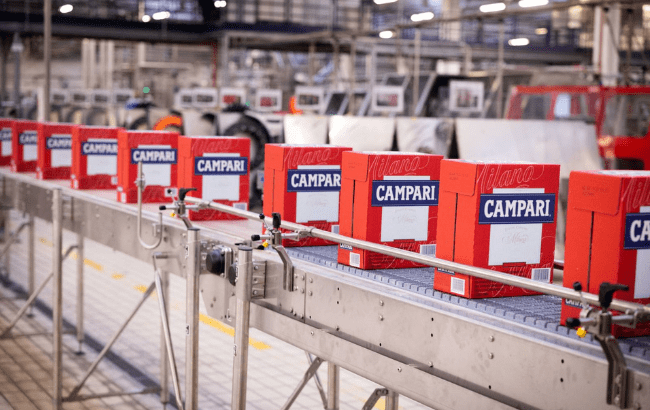Campari fears €45m tariff hit as Q2 sales rise
By Rupert HohwielerAperol owner Campari Group returned to growth in the second quarter (Q2) of 2025 and forecasts a potential tariff impact of up to €45 million (US$51m).

The Italian spirits firm posted a flat performance in the first half (H1) of 2025, with a slight 0.1% organic growth in sales to €1.3 billion (US$1.7bn).
Gross profit rose organically by 0.9% to €934 million (US$1.06bn) and its adjusted earnings before interest and tax (EBIT) was €352 million (US$401m).
Said to be an ‘encouraging start to peak season’, Q2 (up by 3.5%) was a minor improvement on the previous quarter, when sales fell by 4.2%.
Campari Group’s CEO Simon Hunt said the firm’s performance “remains on track” and “good progress has been made” in its strategic priorities, in spite of an environment that “continues to be volatile”.
In its outlook for the rest of 2025, the group warned of the impact of tariffs. Should US president Donald Trump’s targeted 15% tariff on European goods be confirmed, the group suggests its earnings for the year could be affected by up to €45m (US$51m).
However, if EU tariffs are lifted and only taxes on Canada and Mexico remain, then the group has forecast a minimum negative impact of approximately €4m.
The group has previously warned the US tariffs could cost its business €100m (US$106m).
Regional performance
Looking across regions, the Americas, which represent 44% of the group’s sales, fell by 1% in H1 with an improvement on last year’s Q2 (up by 4%).
In the US, which presents an ‘on-going challenging backdrop’, sales were down by 3% in H1, but Q2 showed signs of promise with a 3% upturn.
Espolòn Tequila and Campari Group’s apéritifs helped US sales climb back in Q2, but Skyy vodka experienced ‘persistent challenges’.
Europe, the Middle East and Africa (EMEA), which accounts for 50% of the group’s sales, was up by 1% in H1.
Results in its home base of Italy were flat for the group’s flagship apéritifs Aperol and Campari, but Crodino, Aperol Spritz and Sarti Rosa grew.
Germany was down by 5% in H1, France was up by 1% and the UK saw a double-digit sales jump of 13%. Campari Group noted growth in the UK was driven by Aperol and its namesake Spritz.
Elsewhere, sales in other EMEA markets grew by 6%. Global travel retail (GTR), Greece and Belgium were highlighted for their performance, with apéritifs and Courvoisier Cognac driving growth.
Asia Pacific (APAC), the group’s smallest base with 6% of its total sales, was up by 4%. Australia did the heavy lifting (up by 10%), but other APAC markets were in decline by 3%.
Tequila in growth
Brand-wise, the group’s biggest spirits segment, House of Apéritifs was up by 2% in H1. Aperol rose by 1% (and by 2% in Q2), driven by growth in the Americas.
Campari, however, was down by 2% due to a high comparison base in Brazil. Otherwise, Campari increased by 8% in the US and 1% in EMEA.
The company’s other apéritif brands grew by 10%, with Crodino and Sarti Rosa putting on strong displays.
Tequila’s performance gave reason for encouragement. Its House of Agave portfolio represents 10% of sales and rose by 5%.
Espolòn was up by 5% (with reposado notably up by 14%) and other agave brands rose by 7%, led by Espolòn’s ready-to-drink (RTD) product in Australia and mezcal brand Montelobos in the US.
Whiskey and rum, which sit in the same division and represent 14% of sales, saw a 1% decline. Wild Turkey Bourbon was impacted by a ‘soft performance’ in its core US market, but Jamaican rum (which includes Appleton Estate) grew by 5%.
Cognac-based liqueur Grand Marnier slumped to a 20% drop due to a decline in the US and a high comparison base where it was up by 20% in H1 2024.
Courvoisier sales, meanwhile, were integrated into organic growth in May. The Cognac brand, which Campari acquired from Suntory Global Spirits in May 2024, posted net sales of €62m (US$70.7m).
US investment was a contributing factor – Campari debuted a campaign in the region for Courvoisier over the summer to boost the brand.
Local brands (which represent 21% of group sales) declined by 4% with Skyy vodka decreasing by the same amount. Within this division, sparkling wines and vermouth rose by 3% and the rest of the portfolio was down by 6%.
Reflecting on the performance and the standing for the future, Hunt said: “We recorded a positive organic topline growth in Q2, as expected, in early peak season. In terms of sell-out, our outperformance is continuing across most geographies with further improvement in Q2, driven by apéritifs and Tequila.”
Medium-term guidance
In the medium term, Campari Group reiterated that it aims to achieve ‘mid to high single-digit organic net sales growth’.
Hunt continued: “Looking forward, we confirm that our previously provided guidance for 2025 remains our target, before the impact of US tariffs, and the third quarter will be fundamental for clearer visibility.
“We remain confident in the delivery of long-term sustainable growth and improvement in our balance sheet indicators including our commitment to sustainable cash flow generation and deleverage.”
Last month, Campari Group agreed to sell Cinzano vermouth and Fratinna to Caffo Group 1915 for €100m (US$117m).
Hunt said the deal marked a “key step in our strategy of streamlining our portfolio to increase focus on our key core brands, also with a view to ensure balance sheet deleveraging”.
The group expects the divestment to bring a pre-tax capital gain of approximately €60m (US$68m) once it is finalised by the end of the year.
Related news
Campari Group: ‘major opportunities’ in ultra-premium rum
Campari Group CEO: premiumisation not on hold, but selective
